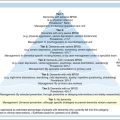Chapter 5 COMMUNITY MENTAL HEALTH TEAMS
INTRODUCTION
This chapter considers community mental health teams for older people. It examines their composition and function. In those places with universal health systems, such as Australia, New Zealand and the United Kingdom, assessment and care of older people with mental health problems is usually carried out by community-based multidisciplinary teams. In urban centres, there are often multidisciplinary teams devoted to the care of older people. As the scientific literature on this topic is sparse, this chapter is based mainly on our own experiences over many years working in dedicated community mental health teams for older people.
TEAM COMPOSITION
The core professions needed by a community mental health team for older people include medicine, nursing, social work, occupational therapy and psychology. There are advantages in also having input from pharmacy, speech pathology, dietetics and physiotherapy, although such personnel are likely to be used solely for their profession-specific knowledge and skills, rather than for generic mental health tasks, such as initial assessment and case management. Even with the advent of mobile communications technology, community teams cannot work well without competent support from administrative personnel.
GENERIC CLINICAL ROLES
Despite ample opportunities to practise specific professional roles in most community mental health teams for older people, there are generic clinical roles that most members of such teams will need to gain familiarity with. All team members will need to be competent at doing initial clinical assessments, including mental state examinations, and all team members will need to understand case management as it is applied to older people with mental health problems. Teams vary in the extent to which they mix the application of generic and profession-specific roles. However, as a broad generalisation, mental health teams for older people probably use profession-specific skills more frequently than adult mental health teams.
THE VALUE OF DIFFERENT PERSONALITY TYPES
In his excellent book on community mental health teams, Burns (2004, pp 23–24) recommends a mix of personality types in a community mental health team. He recognises that ‘a core of unflappable staff’ is necessary for people to feel ‘contained and safe’. But he also indicates that it is useful to have personnel who ‘thrive on crises or who can communicate excitement and enthusiasm’.
TOLERANCE AND HUMOUR
In any community mental health team for older people, there is likely to be a mix of personality styles and a mix of motivations for working in this challenging field. Sometimes, these differences will cause friction among team members. Tolerance is an essential ingredient for working with the mentally ill and an essential ingredient for working in a well-functioning team. Humour is often useful in defusing a difficult situation that has arisen within a team, although it does take some time to know just how far to take certain types of humour.
Stay updated, free articles. Join our Telegram channel

Full access? Get Clinical Tree





